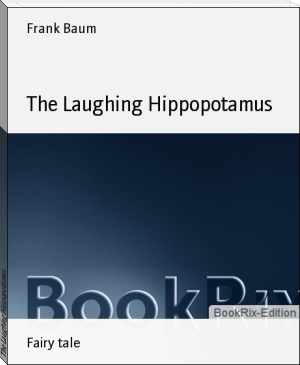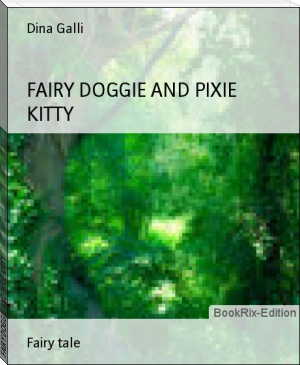The Laughing Hippopotamus by Frank Baum (superbooks4u txt) 📖

- Author: Frank Baum
Book online «The Laughing Hippopotamus by Frank Baum (superbooks4u txt) 📖». Author Frank Baum
THE LAUGHING HIPPOPOTAMUS
On one of the upper branches of the Congo river lived an ancient and aristocratic family of hippopotamuses, which boasted a pedigree dating back beyond the days of Noah—beyond the existence of mankind—far into the dim ages when the world was new.
They had always lived upon the banks of this same river, so that every curve and sweep of its waters, every pit and shallow of its bed, every rock and stump and wallow upon its bank was as familiar to them as their own mothers. And they are living there yet, I suppose.
Not long ago the queen of this tribe of hippopotamuses had a child which she named Keo, because it was so fat and round. Still, that you may not be misled, I will say that in the hippopotamus language "Keo," properly translated, means "fat and lazy" instead of fat and round. However, no one called the queen's attention to this error, because her tusks were monstrous long and sharp, and she thought Keo the sweetest baby in the world.
He was, indeed, all right for a hippopotamus. He rolled and played in the soft mud of the river bank, and waddled inland to nibble the leaves of the wild cabbage that grew there, and was happy and contented from morning till night. And he was the jolliest hippopotamus that ancient family had ever known. His little red eyes were forever twinkling with fun, and he laughed his merry laugh on all occasions, whether there was anything to laugh at or not.
Therefore the black people who dwelt in that region called him "Ippi"—the jolly one, although they dared not come anigh him on account of his fierce mother, and his equally fierce uncles and aunts and cousins, who lived in a vast colony upon the river bank.
And while these black people, who lived in little villages scattered among the trees, dared not openly attack the royal family of hippopotamuses, they were amazingly fond of eating hippopotamus meat whenever they could get it. This was no secret to the hippopotamuses. And, again, when the blacks managed to catch these animals alive, they had a trick of riding them through the jungles as if they were horses, thus reducing them to a condition of slavery.
Therefore, having these things in mind, whenever the tribe of hippopotamuses smelled the oily odor of black people they were accustomed to charge upon them furiously, and if by chance they overtook one of the enemy they would rip him with their sharp tusks or stamp him into the earth with their huge feet.
It was continual warfare between the hippopotamuses and the black people.
Gouie lived in one of the little villages of the blacks. He was the son of the chief's brother and grandson of the village sorcerer, the latter being an aged man known as the "the boneless wonder," because he could twist himself into as many coils as a serpent and had no bones to hinder his bending his flesh into any position. This made him walk in a wabbly fashion, but the black people had great respect for him.
Gouie's hut was made of branches of trees stuck together with mud, and his clothing consisted of a grass mat tied around his middle. But his relationship to the chief and the sorcerer gave him a certain dignity, and he was much addicted to solitary thought. Perhaps it was natural that these thoughts frequently turned upon his enemies, the hippopotamuses, and that he should consider many ways of capturing them.
Finally he completed his plans, and set about digging a great pit in the ground, midway between two sharp curves of the river. When the pit was finished he covered it over with small branches of trees, and strewed earth upon them, smoothing the surface so artfully that no one would suspect there was a big hole underneath. Then Gouie laughed softly to himself and went home to supper.
That evening the queen said to Keo, who was growing to be a fine child for his age:
"I wish you'd run across the bend and ask your Uncle Nikki to come here. I have found a strange plant, and want him to tell me if it is good to eat."
The jolly one laughed heartily as he started upon his errand, for he felt as important as a boy does when he is sent for the first time to the corner grocery to buy a yeast cake.
"Guk-uk-uk-uk! guk-uk-uk-uk!" was the way he laughed; and if you think a hippopotamus does not laugh this way you have but to listen to one and you will find I am right.
He crawled out of the mud where he was wallowing and tramped away through the bushes, and the last his mother heard as she lay half in and half out of the water was his musical "guk-uk-uk-uk!" dying away in the distance.
Keo was in such a happy mood that he scarcely noticed where he stepped, so he was much surprised when, in the middle of a laugh, the ground gave way beneath him, and he fell to the bottom of Gouie's deep pit. He was not badly hurt, but had bumped his nose severely as he went down; so he stopped laughing and began to think how he should get out again. Then he found the walls were higher than his head, and that he was a prisoner.
So he laughed a little at his own misfortune, and the laughter soothed him to sleep, so that he snored all through the night until daylight came.
When Gouie peered over the edge of the pit next morning he exclaimed:
"Why, 'tis Ippi—the Jolly One!"
Keo recognized the scent of a black man and tried to raise his head high enough to bite him. Seeing which Gouie spoke in the hippopotamus language, which he had learned from his grandfather, the sorcerer.
"Have peace, little one; you are my captive."
"Yes; I will have a piece of your leg, if I can reach it," retorted Keo; and then he laughed at his own joke: "Guk-uk-uk-uk!"
But Gouie, being a thoughtful black man, went away without further talk, and did not return until the following morning. When he again leaned over the pit Keo was so weak from hunger that he could hardly laugh at all.
"Do you give up?" asked Gouie, "or do you still wish to fight?"
"What will happen if I give up?" inquired Keo.
The black man scratched his woolly head in perplexity.
"It is hard to say, Ippi. You are too young to work, and if I kill you for food I shall lose your tusks, which are not yet grown. Why, O Jolly One, did you fall into my hole? I wanted to catch your mother or one of your uncles."
"Guk-uk-uk-uk!" laughed Keo. "You must let me go, after all, black man; for I am of no use to you!"
"That I will not do," declared Gouie; "unless," he added, as an afterthought, "you will make a bargain with me."
"Let me hear about the bargain, black one, for I am hungry," said Keo.
"I will let your go if you swear by the tusks of your grandfather that you will return to me in a year and a day and become my prisoner again."
The youthful hippopotamus paused to think, for he knew it was a solemn thing to swear by the tusks of his grandfather; but he was exceedingly hungry, and a year and a day seemed a long time off; so he said, with another careless laugh:
"Very well; if you will now let me go I swear by the tusks of my grandfather to return to you in a year and a day and become your prisoner."
Gouie was much pleased, for he knew that in a year and a day Keo would be almost full grown. So he began digging away one end of the pit and filling it up with the earth until he had made an incline which would allow the hippopotamus to climb out.
Keo was so pleased when he found himself upon the surface of the earth again that he indulged in a merry fit of laughter, after which he said:
"Good-by, Gouie; in a year and a day you will see me again."
Then he waddled away toward the river to see his mother and get his breakfast, and Gouie returned to his village.
During the months that followed, as the black man lay in his hut or hunted in the forest, he heard at times the faraway "Guk-uk-uk-uk!" of the laughing hippopotamus. But he only smiled to himself and thought: "A year and a day will soon pass away!"
Now when Keo returned to his mother safe and well every member of his tribe was filled with joy, for the Jolly One was a general favorite. But when he told them that in a year and a day he must again become the slave of the black man, they began to wail and weep, and so many were their tears that the river rose several inches.
Of course Keo only laughed at their sorrow; but a great meeting of the tribe was called and the matter discussed seriously.
"Having sworn by the tusks of his grandfather," said Uncle Nikki, "he must keep his promise. But it is our duty to try in some way to rescue him from death or a life of slavery."
To this all agreed, but no one could think of any method of saving Keo from his fate. So months passed away, during which all the royal hippopotamuses were sad and gloomy except the Jolly One himself.
Finally but a week of freedom remained to Keo, and his mother, the queen, became so nervous and worried that another meeting of the tribe was called. By this time the laughing hippopotamus had grown to enormous size, and measured nearly fifteen feet long and six feet high, while his sharp tusks were whiter and harder than those of an elephant.
"Unless something is done to save my child," said the mother, "I shall die of grief."
Then some of her relations began to make foolish suggestions; but presently Uncle Nep, a wise and very big hippopotamus, said:
"We must go to Glinkomok and implore his aid."
Then all were silent, for it was a bold thing to face the mighty Glinkomok. But the mother's love was equal to any heroism.
"I will myself go to him, if Uncle Nep will accompany me," she said, quickly.
Uncle Nep thoughtfully patted the soft mud with his fore foot and wagged his short tail leisurely from side to side.
"We have always been obedient to Glinkomok, and shown him great respect," said he. "Therefore I fear no danger in facing him. I will go with you."
All the others snorted approval, being very glad they were not called upon to go themselves.
So the queen and Uncle Nep, with Keo swimming between them, set out upon their journey. They swam up the river all that day and all the next, until they came at sundown to a high, rocky wall, beneath which was the cave where the might Glinkomok dwelt.
This fearful creature was part beast, part man, part fowl and part fish. It had lived since the world began. Through years of wisdom





Comments (0)